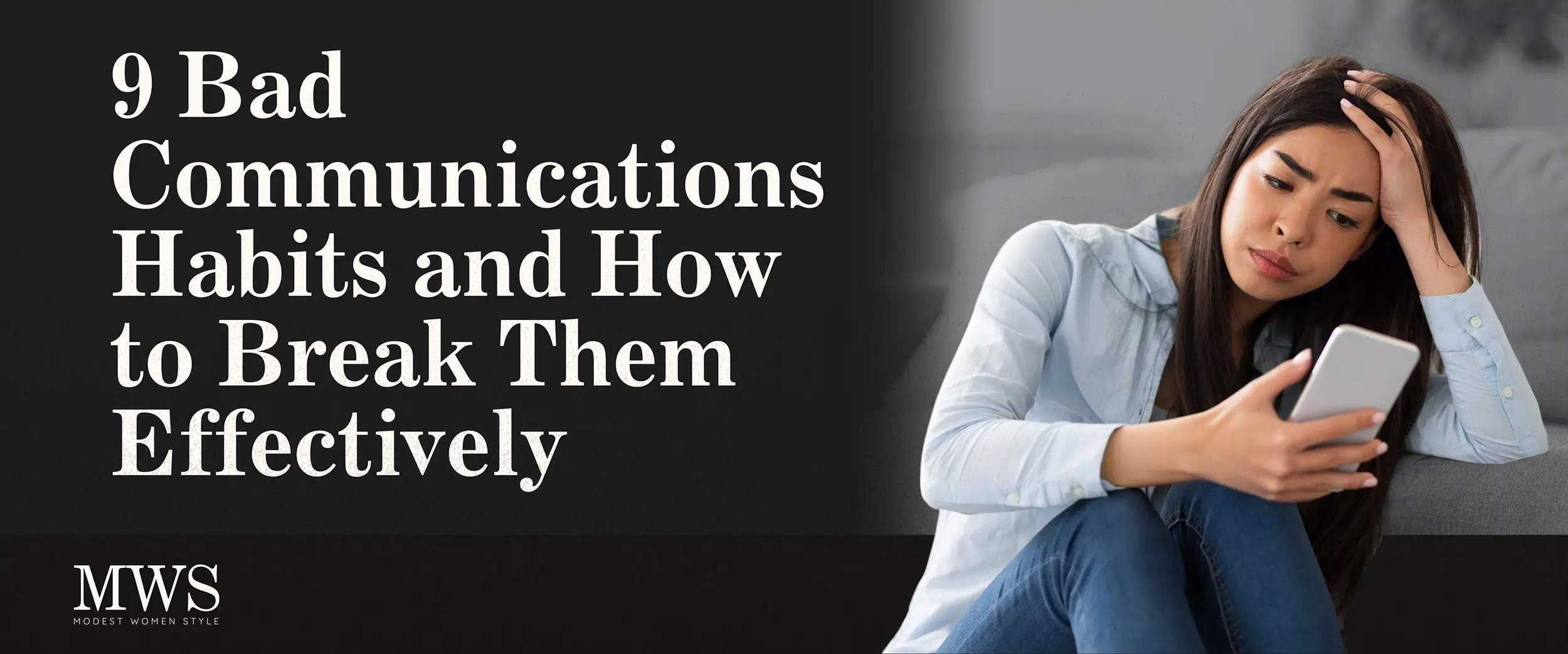Communication plays a vital role in our daily dealings. One or two bad habits are all it takes to cause a lifetime of trouble.
While this is the best time in human history to be a competent communicator, it’s true, on the other hand, that it can be incredibly difficult to break free of the bad habits related to the convenience, distraction, self-expression, and excess that portrays so much in our digital era. Yet our initiative to cast off some of our bad communication habits can go a long way in optimizing opportunities to connect productively and meaningfully with other people.

Below are the nine common faux pas you may find yourself guilty of. Well, it’s time for you to pull in the reins and stop – immediately.
- Assuming malice
“Never assume malice where ignorance could be the answer.”
- Constantly interrupting.
If you have a habit of constantly interrupting, you need to keep yourself in check.
We all have one thing in common when talking: We want to be listened to, and you might think by that, you show your level of engagement. But if you cannot even complete people’s sentences for them, more often than not, you make yourself a conversational bulldozer.
Do yourself a favor: Count to five before responding. This discipline will ensure that the other person has completed relaying their thoughts before you begin sharing yours. It also has the added benefit of giving the impression that you’re a good listener who carefully reflects on what the other person has said.
- Multitasking.
In wanting to expedite everything, we tend to multitask and get half-hearted on the present conversation, which deserves full attention. We’re likely all guilty of this, but we need to be willing to rip our focus away from smartphones, emails, or other things we subconsciously think about.
Practice Periods Of Unavailability; Put the phone away
We’re all wired these days and are constantly connected to the world through an array of devices to see our latest emails and notifications from social media outlets. However, recurrently checking these when we are in the company of others can communicate that you’re not tuned in, and can be perceived as rude.
Carve out periods during your day when the technology is turned off or removed from your presence, and relearn how to communicate!
- Using qualifiers.
“Hey, Mark Umm … I’m just checking in on that, uhhh …
“This might be a bad idea, but…”; or “I know what you’re thinking, but…”
You knew this one had to make it onto the list somewhere. This is perhaps one of the toughest bad habits to break.
Qualifiers exist in nearly every situation. But if you tend to overuse them, you may be brushing people off. Why? Well, while these prefacing statements might seem like a great sugarcoat to your sentences, they often just come off as condescending and unnecessary. Make your best efforts to cut them out. You’ll soon realize your conversations are way much cleaner and more polished.
4. Equating your experiences.
“I know exactly how you feel!” – Sounds familiar?
Then you immediately retort with and then launch into your long-winded tale of a time you experienced something that’s not even at par with someone’s explanation of a difficult problem he’s currently facing.
Note that it’s important to remember that human experiences are all different. Your efforts to show empathy are commendable. But in most cases, you’re better off just listening and lending support, instead of being too much opinionated.
5. Floundering.
We’ve all had to deal with those people who seem lost in their overflowing words and just wander on endlessly without a point – those people who love talking simply because they like the sound of their voices.
You don’t want to garner this reputation for yourself by continually chiming in without a clear purpose. When you do decide to speak up, make sure that you’re prepared to be concise and clear. That’s the mark of a skilled communicator.
How to do this? Try Talking Less.
Overtalking leads to under-listening, and listening is the greatest communication skill, which requires genuine curiosity and inquiries about the other person’s interests, concerns, aspirations, and goals. Listening comes off as a challenge when someone’s desire to advocate his position is too strong. Advocating leads to one-way pushing of information in forms of telling, directing, instructing, and lecturing–these are counter-productive and may get people run over hills. Unless you’re a sociopathic narcissist who speaks at a massive business event, listen more than you speak.
6. Avoiding direct contact.
I’m a big fan of the convenience of email and text messages. However, if you’ve ever dealt with someone who took the time to write out a lengthy message for something he or she could have easily explained to you in person in as few as two sentences, you know how frustrating that can be.
The never-ending assortment of communication tools available today has made us all a little less willing to talk to one another. So before hitting send on a message, ask yourself if this is something that could be done more efficiently in person or over the phone. You’ll save yourself (and the person on the receiving end!) a lot of headaches.
7. Waiting instead of listening.
As my mom always loves to tell me, “There’s a big difference between hearing and listening!” And when you’re having a conversation with someone, you should be actively listening.
That means you’re not just staying silent while thinking of your next point and waiting for your chance to talk again. Instead, you’re engaged in what that person is explaining. Trust me — people can tell when you’re tuning them out.
Keep Your Opinions To Yourself (Unless Asked)
Don’t give your opinion when it’s not required or hasn’t been asked for. Being intentional about listening to the other person and recognizing that their opinions matter will help curtail this habit. How do you feel when people give unsolicited opinions? Adapt your communication to be more respectful to others. – Frances McIntosh, Intentional Coaching LLC
8. Using filler words.
“Hey, Jason. Umm … I’m just checking in on that, uh… report to see if you think you’ll, like, have that done by the end of the day.”
You knew this one had to make it onto the list somewhere. This is perhaps one of the toughest bad habits to break. We’re all so used to littering our sentences with these unnecessary words — it’s like a nervous tic for most of us. But do your best to cut them out. Your conversations will be much cleaner and more polished.
Don’t Filter, Just Listen
At work, we screen information at lightning speed and focus on what is most important. However, this skill is detrimental to effectively communicating with others. When listening, turn off the filter in your head that says, “Not important right now,” and instead reserve your judgment and ask questions to clarify. Breaking this habit will enable you to connect and actually
get more done.
– Loren Margolis, Training & Leadership Success LLC
Remove The ‘Junk’ From Your Conversations
Many of us are guilty of allowing “filler” words and phrases to crowd our conversations. They squeeze out the value of what we are trying to express. Examples include, “Yes, yes” “I know” or “You know…” Such phrases are crutches: We rely on them when our mouths are moving faster than our brains. Slow down to consider what to say before you say it, then such filler words begin to disappear. – Leila Bulling Towne, The Bulling Towne Group, LLC
9. Overreacting. In 2013, we often used more force than needed to accomplish our objectives. We yelled when a measured response would have worked better, sent a blistering e-mail when a more restrained reply would have sufficed, and issued an ultimatum when a firm but gentle statement of convictions would have done the trick. But excessive force frequently causes a destructive cycle of attack, retaliation, escalated attack, and escalated retaliation, etc. No matter how justified you may feel, the bottom line is that using excessive force isn’t usually a winning strategy.
“Exercising restraint during a contentious interaction is challenging, but try to apply the least amount of interpersonal force and intensity necessary to accomplish your objective, asserts Tumlin. “In other words, bring a stick to a knife fight to prevent a conversation from escalating dangerously. Try to stay serious and focused, don’t add any new emotional material, and keep the conversation as brief as possible. Be the calm, controlled, and stabilizing influence on a conversation that’s become heated so you can minimize the chance of permanent relational damage.
Confirm Your Understanding Of Problems Before Trying To Solve Them
Most of us have been rewarded in school and work for quick solutions and being right, so we tend to jump to an answer before knowing the situation better. Ask questions to be sure you’re getting to the real problem, and then listen with curiosity to get to the root cause. For example: “What is the real issue we need to tackle?” or, “What else is going on that we haven’t yet explored?” – Bonnie Davis, Destination Up
Get Out Of Your Reactive State Before Responding
People often communicate from a reactive state: reacting to a problem, something they don’t like, something they heard etc., which creates an environment for more confusion, chaos, and more of what’s not wanted. Practice refraining from communicating immediately. Take a walk, clear your head, breathe deeply, and feel better, then communicate from a clearer, more intentional space. – Christine Meyer, Christine Meyer Coaching
Practice Proactive Communication With The 80/20 Rule
Powerful communication is only 20% about making yourself understood and 80% about genuinely and proactively trying to understand your counterpart. When trying to understand, just listening is not enough. Being proactive means asking questions. Contrary to popular belief, it is often perfectly appropriate to interrupt as long as it is simply to verify that you are understanding correctly. – Mehrdad Moayedzadeh, Life Is Important
Take Responsibility For Your Message Delivery
The person trying to communicate a message should take responsibility for it getting delivered correctly. It is amazing how much more effective we communicate once we take responsibility for ensuring that things are not misunderstood. You get rid of statements such as, “I told you XYZ, you must have not heard me.” Effective professional speakers and communicators always take responsibility. – Donald Hatter, Donald Hatter Inc.
Watch Your Nonverbal ‘Approachability’ Cues
A bad habit related to communication we can fall into is to send signals not to approach us. A few examples: no eye contact when in the presence of others, being short and abrupt when answering open-ended questions, keeping your office door closed, and having a negative disposition. To have effective communication, we need to make ourselves available, be approachable, and then be present when we listen. – Randy Goruk, The Randall Wade Group, LLC
Check Your Grammar And Professionalism
In written communication, it is important to train ourselves to avoid allowing the influence of texting to interfere with professional business communication. It’s tempting to use abbreviations and acronyms because they are faster. However, it is important to remember in effective business communication, we maximize our ability to be understood and reach larger audiences by using proper grammar. – Eddie Turner, Eddie Turner LLC










